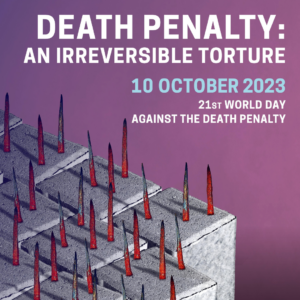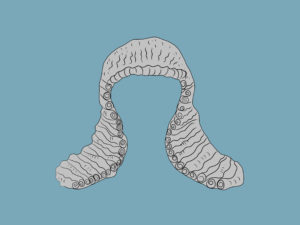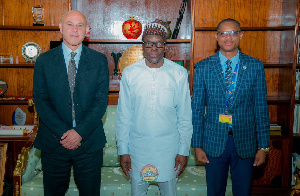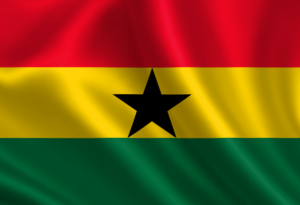
Sentenced to death for killing her abusive ex-boyfriend as he attacked her: Aminata's story shows the importance of considering mitigating circumstances
- News
- 20 Jul 2021
Aminata was sentenced to death for killing her abusive ex-boyfriend as he attacked her in her home
- Now pardoned and reintegrating back into society, we hear about her experience and why she feels consideration of mitigating circumstances in cases like hers is essential.
- As parliament meets this week to decide the future of the death penalty in Sierra Leone, it is vital we share stories like Aminata’s.
In 2009, Aminata, from Kenema in the east of the country, was found guilty of killing her abusive ex-boyfriend and received the death penalty, the mandatory sentence for murder. She was just 17 years old.
Like many people in Sierra Leone, Aminata had no birth certificate to prove her age. She was subject to adult proceedings and sentenced to death despite her being a victim of domestic violence and sustained harassment from her ex-partner.
On the day in question, her ex had forced his way into her home and beaten her with a rubber pipe. During the struggle, Aminata fell to the ground. Reaching out for something to defend herself with; she picked up a knife. It was not until her arrest that she learned her ex-partner had died.
Amanita’s story is not just an isolated incident of a woman sentenced to death for murder, or subject to a mandatory life sentence for a homicide committed in the context of gender-based violence. It is a troubling example of why a mandatory sentencing system that fails to take account of domestic violence as a mitigating factor produces arbitrary and disproportionate outcomes.
Aminata had very little understanding of her rights, not only after arrest but also her rights in general; “I didn’t know that a woman could report a man to the police because of abuse, if I had known I would never have ended in prison.”
This lack of understanding disadvantaged Aminata throughout the legal process; “I didn’t hear my sentence until I arrived at Court. The officer told me the sentence and it was like hell. I was losing all hope.”
When asked why she feels that mitigating circumstances are so important, Aminata replied: “I know taking a life is a sin, how could I want to take someone’s life if nothing bad had happened to me before? People should always consider what prompted a crime.” For women charged with murder when defending themselves, the mandatory death penalty makes no distinction between potential degrees of seriousness. The judge had no discretion other than to impose the death sentence and as such domestic violence was given no weight as a mitigating factor.
In 2011 Aminata’s death sentence was commuted to life imprisonment by a Presidential Pardon. AdvocAid filed an appeal on her behalf and in 2019, after a four-year long wait, Aminata’s conviction for murder was quashed and she was released.
However, after nearly a decade in prison, the experience has had a devastating impact on Aminata’s life; “My experience in prison was hell, I fell sick for 3 years and had a break down. I had to go to the psychiatric hospital for treatment. I tried to commit suicide because I did not want to go on. My only coping strategy is I accept myself.”
One of the hardest aspects for Aminata has been the isolation she has experienced from her family and community. She has lost all contact with her relatives, despite AdvocAid reaching out to them and updating them on her release. The social stigma has been difficult to overcome. AdvocAid is now working with Aminata, and others like her, to support them as they integrate back into society and by offering counselling to help navigate the trauma they’ve experienced.
AdvocAid and The Death Penalty Project have worked together since 2007, providing free legal support to women like Aminata and other marginalised women in prison, as well as working with the country’s leadership and international community to advocate for the abolition of the death penalty. Recently Aminata has been supporting that work, meeting with ministers, diplomats and other stakeholders to share her powerful story.
On Wednesday 21 July, the Parliament of Sierra Leone, will vote on the Abolition of the Death Penalty Act 2021, and could become the 110th country in the world to end capital punishment. Aminata will join Advocaid in parliament on Wednesday to witness the momentous vote.
Rhiannon Davis, Executive Director of AdvocAid said “We welcome this major step forward as Parliament debates legislation to abolish the death penalty in Sierra Leone. For 15 years, AdvocAid has tirelessly fought for abolition, through litigation, advocacy, and by sharing the stories of women and men, like Aminata, with lived experience of death row. Replacing the death penalty with alternative, non-mandatory sentences is an important step forward in establishing a more gender-sensitive justice system. This approach gives scope to consider the factors that lead women to come into contact with the law, which often include histories of poverty and gender-based violence. We hope to see Parliament secure an historic achievement for human rights in Sierra Leone on Wednesday by removing the death penalty.”
Saul Lehrfreund, Co-Executive Director of The Death Penalty Project said;
“This is a critical week in Sierra Leone as Parliament will decide on Wednesday whether the death penalty should be abolished. Cases like Aminata’s provide a compelling argument as to why the death penalty should be replaced by a flexible and discretionary sentencing system that is able to take into account mitigating factors, including crimes committed in situations of gender-based violence, as well as other critical factors such as the vulnerability, age and mental state of the accused. We hope that Parliament will seize the opportunity to consign the death penalty to history and at the same time recognise the importance of individualised sentencing, so all punishment is tailored to the circumstances of any given case.”
Notes to editors
*Aminata is a pseudonym to protect the individual’s identity and that of her family.
Death Penalty Project
For interview requests, quotes or more information, please contact press@deathpenaltyproject.org
AdvocAid
AdvocAid is the only organisation in Sierra Leone that provides free legal representation for women and men on death row to challenge their convictions and death sentences. Since 2006, AdvocAid has secured the release of six women and three men on death row through appeals or presidential pardon applications.
For more information on AdvocAid or interview please contact: Rhiannon Davis [email protected]
Abolition around the world
The last three decades have witnessed an unprecedented global rate of abolition of the death penalty. Of the 193 member states of the United Nations, 109 countries have abolished the death penalty in law for all crimes, and a further eight countries have abolished the death penalty in law for ordinary crimes. A further 27 countries are classified by Amnesty International as abolitionist in practice meaning that 72% of all countries in the world—144 countries—have abolished the death penalty in law or practice.
Death penalty in Africa
In May 2021, Malawi became the 21st in the African Union to abolish the death penalty in law.
In 2019, only five of 55 countries in the African Union carried out executions: Egypt, South Sudan, Sudan, Somalia, and Botswana.
In 2019, the African Court on Human and Peoples’ Rights declared that the mandatory death sentence violates the right to life and fair trial under the African Charter.
In other parts of the African Union, there has been marked progress towards abolition. The Central African Republic has recently made plans to establish a committee to examine a bill on the abolition of the death penalty within the National Assembly. In April 2019, Equatorial Guinea announced a draft law to abolish the death penalty, in 2020, Chad abolished the death penalty for all crimes and earlier this year, the Supreme Court of Malawi declared the death penalty unconstitutional.




















